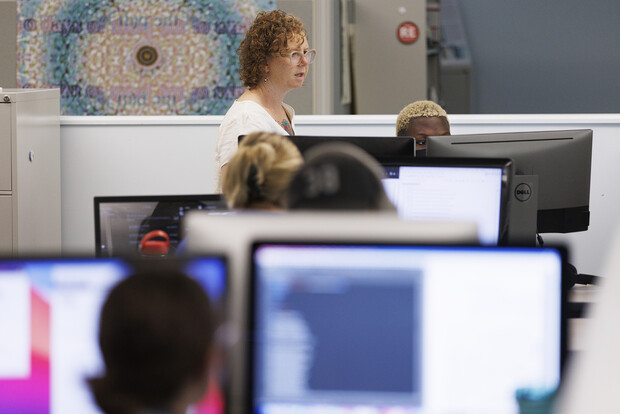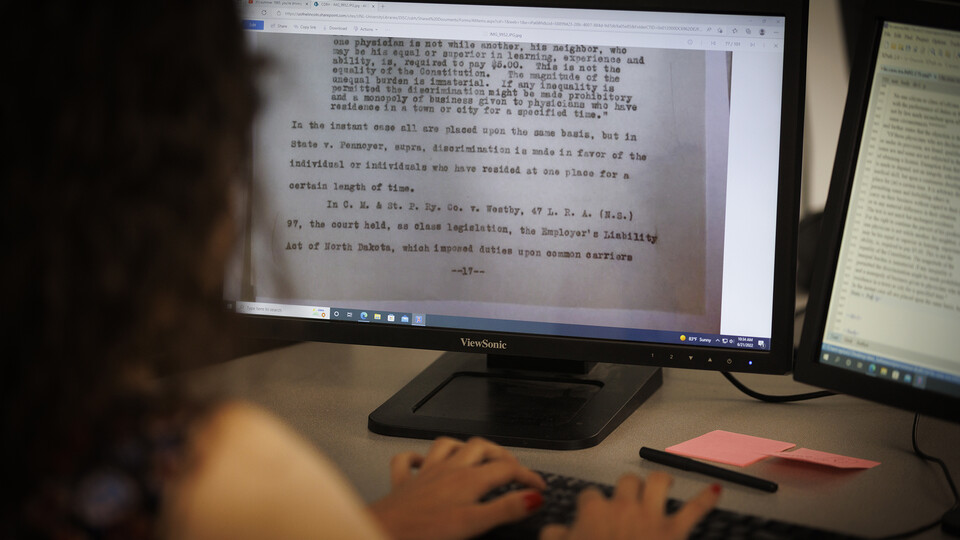Deann Gayman, July 12, 2022
New research experience has historical, legal focus
AD Banse examined the scrawled words on his screen and realized that after a few days of examining century-old documents, he was becoming more adept at deciphering the often faded, often perplexing handwriting and vernacular of the era.
“I think there’s both a challenge, as well as a riveting aspect, to it,” Banse said. “The most challenging aspect has been understanding sometimes illegible writing.”
What had him riveted was reading an enslaved person’s story from more than 50 pages of a habeas corpus petition.
“There are moments while I’m working where I’m taken aback, when I remember these are true stories of people who had to combat very difficult traumas in their lives,” Banse said.
Banse, a senior at St. Olaf College in Northfield, Minnesota, is one of eight student scholars from across the United States doing historical legal research in the University of Nebraska–Lincoln’s Digital Legal Research Lab, a new research experience for undergraduates. The lab is funded by the National Science Foundation for three years and led by principal investigator Katrina Jagodinsky, Susan Rosowski associate professor and graduate chair in history; and co-principal investigator William G. Thomas, Angle Chair in the Humanities, professor of history and associate dean for research and graduate education in the College of Arts and Sciences.

Students in the program are spending the summer transcribing, encoding and annotating digitized records from habeas corpus petitions and freedom suits, which will be included in the digital humanities projects “Petitioning for Freedom: Habeas Corpus in the American West” and “O Say Can You See: Early Washington, D.C., Law and Family,” respectively.
“We’re unique in that there aren’t a lot of REUs that are history focused,” Jagodinsky said. “My co-PI and I really saw a gap in training in legal history, and legal research generally, that we felt we could address. In graduate school, researchers are expected to be able to navigate legal archival research, digital databases for legal research, and then also apply sophisticated methods and methodologies to that work, but there’s very little undergraduate training or preparation for that work.”
With that in mind, Jagodinsky said students learn several new skills, including archival research methods, data collection and processing, transcription and encoding techniques. Additionally, students receive professional development and mentoring.
That aspect especially appealed to Banse, who reached out to Jagodinsky before applying.
“I wanted to know about the project, and I wanted a program where I would be mentored and be in an environment that would motivate me, push me and prepare me for my future,” said Banse, a political science major. “I’ve gotten everything I wanted and that has been very gratifying.”
For Ellyzabeth Morales-Ledesma, a senior with history and behavioral neuroscience majors at St. Edward’s University in Austin, Texas, the research experience is an opportunity to try her hand at being a historian, as she’s mulling a decision about her future career path.
“It’s definitely been very informative,” Morales-Ledesma said. “I’m really getting to see what it means to work in the history field, or what it would look like if I decided to go to grad school in history. I’m learning a lot about the field that I don’t think I would have learned in a regular classroom setting.”

The research experience runs from June 1 through Aug. 4. Students typically spend part of the day in a computer lab in the Center for Digital Research in the Humanities, working with the digitized documents. Lectures, discussions and readings are also part of the syllabus. The program culminates with a small research fair, where the students will present individual projects they developed.
“I don’t have any historical background at all,” said Mariam Daoud, a senior in psychology and social and criminal justice at Coe College in Cedar Rapids, Iowa. “This has been really helpful in teaching me to think critically about all the research that I gather to make sure it is ethical, it’s credible, that it is reflective of the historical context. This research has taught me to be more critical and holistic in my research.
“It’s completely uncharted territory for me. In the best way possible, it’s been a little stressful, as I’m developing a whole new skill set.”






